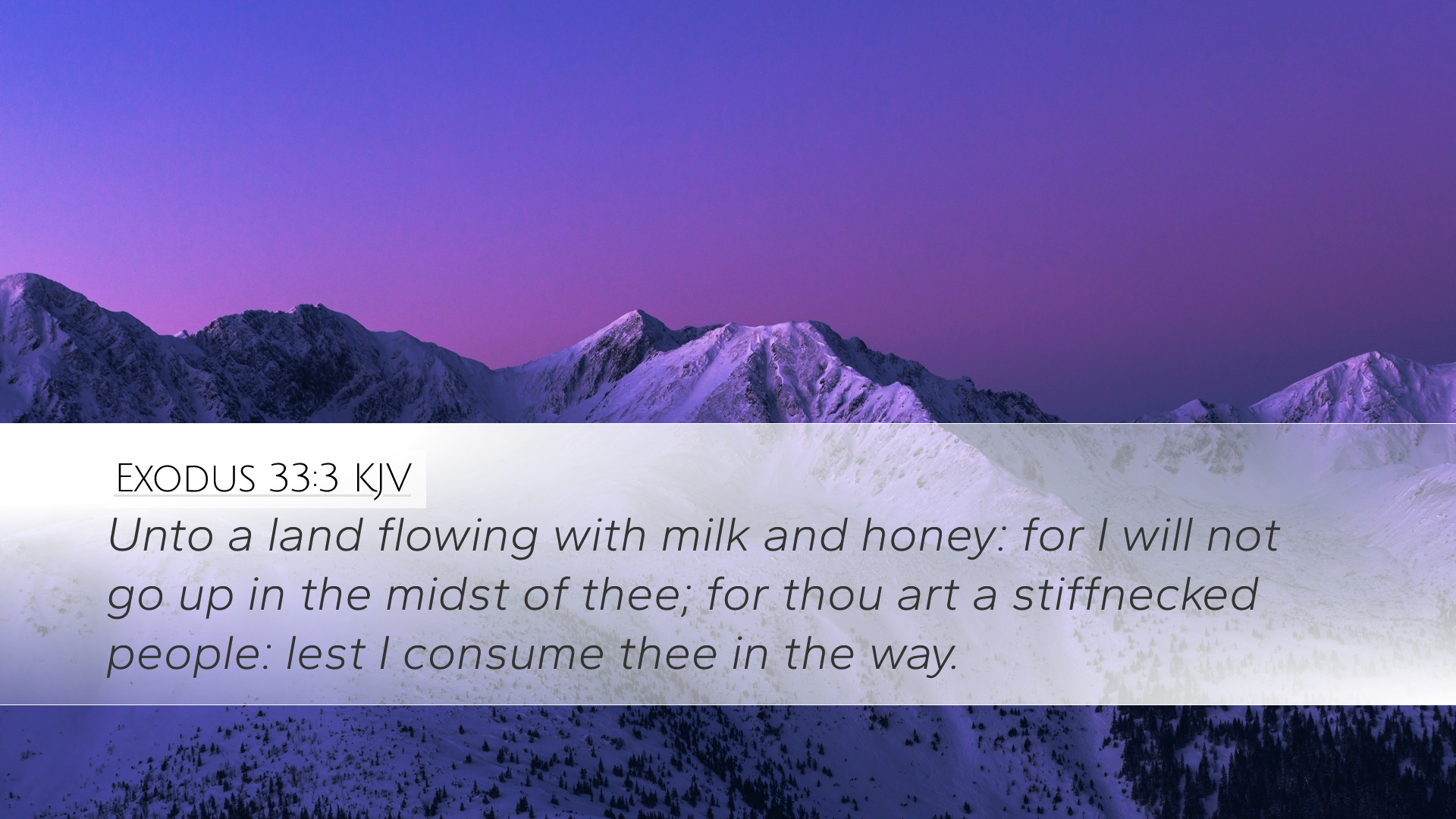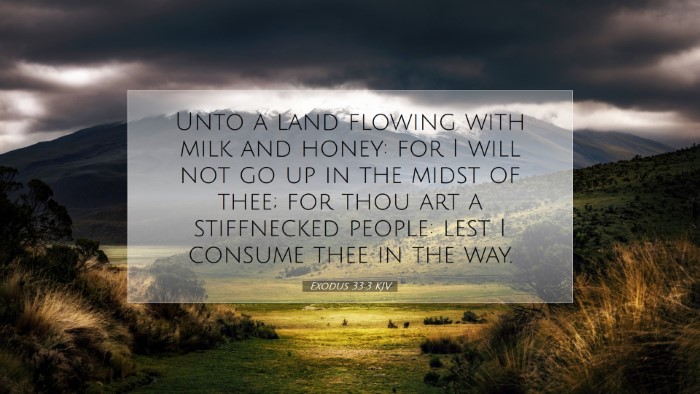Exodus 33:3 - Commentary
Exodus 33:3 states:
"Unto a land flowing with milk and honey: for I will not go up in the midst of thee; for thou art a stiffnecked people: lest I consume thee in the way."
Introduction
This verse encapsulates a critical moment in Israel's journey to the Promised Land. Here, God informs Moses of His decision not to accompany the Israelites because of their stubbornness. The commentary on this verse reveals profound theological insights about God's relationship with humanity, His holiness, and the implications of sin.
The Significance of the Land
Both Matthew Henry and Adam Clarke emphasize the importance of the promised land, symbolizing God's abundant provision and blessings. The phrase "flowing with milk and honey" signifies prosperity and richness—a contrast to the wilderness experience of the Israelites.
- Matthew Henry: Highlights that the land serves not only as a physical promise but also as a spiritual metaphor for God's goodness and mercy towards His people.
- Albert Barnes: Stresses that this land represents the ultimate favor of God, a place of rest, nourishment, and divine blessing, leading to spiritual fulfillment.
- Adam Clarke: Comments on the significance of the land flowing with milk and honey, suggesting it represents the abundant life that God offers to those who follow Him faithfully.
The Stiff-Necked People
The term "stiffnecked" is crucial for understanding God's response. It denotes stubbornness and resistance to divine instruction, reflecting Israel's continual disobedience despite witnessing God's miracles.
- Matthew Henry: Points out that the stiff-necked nature of the people is a metaphor for their obstinacy, warning of the dangers of persistent rebellion against God's authority.
- Albert Barnes: Notes that this behavior invokes divine judgment, where God's holiness cannot dwell among such sinful conduct.
- Adam Clarke: Explains that the stiff-necked attitude not only leads to separation from God but also jeopardizes their journey toward fulfillment of God's promises.
The Absence of God's Presence
God's statement "for I will not go up in the midst of thee" is a poignant declaration of the risk associated with sin. The absence of God's presence signifies a lack of divine guidance and protection.
- Matthew Henry: Clarifies that God's guidance is essential for their journey, equating His presence with the assurance of security and favor.
- Albert Barnes: Argues that complete separation from God leads to destruction and implies the dire consequences of a disobedient life.
- Adam Clarke: Discusses the implications of God's absence; without Him, the Israelites are left vulnerable in a hostile environment, unable to thrive.
The Holiness of God
The verse concludes with the sobering reminder that God's holiness cannot tolerate sin: "lest I consume thee in the way." This serves as an important theological reflection on God's nature.
- Matthew Henry: Emphasizes that God's holiness necessitates justice, reinforcing the need for repentance and humility among the people.
- Albert Barnes: Highlights that holiness and justice are inseparable, a fundamental aspect of God's character that demands accountability from His people.
- Adam Clarke: Elaborates on the theme of divine righteousness, stating that God’s wrath against sin is as real as His love and mercy, reminding believers of the consequences of transgression.
Theological Implications
This passage serves as a profound reminder for contemporary readers, especially pastors and theologians, about the nature of God's relationship with humanity.
- Covenant Relationship: Reflecting on the covenant made with Israel reveals the ongoing requirements for faithfulness and obedience to God.
- The Necessity of Repentance: The stiff-necked nature demands a call to repentance—an invitation to recognize one’s own stubbornness and turn back to God for restoration.
- God's Holiness: Scholars emphasize the importance of understanding God’s character, acknowledging that His holiness provides both assurance and a call to reverence.
Conclusion
Exodus 33:3 encapsulates essential truths about the nature of God, the consequences of disobedience, and the importance of striving for a relationship characterized by humility and faithfulness. Public domain commentaries collectively highlight these aspects, offering insights that remain applicable for today's church leaders, students, and theologians.


